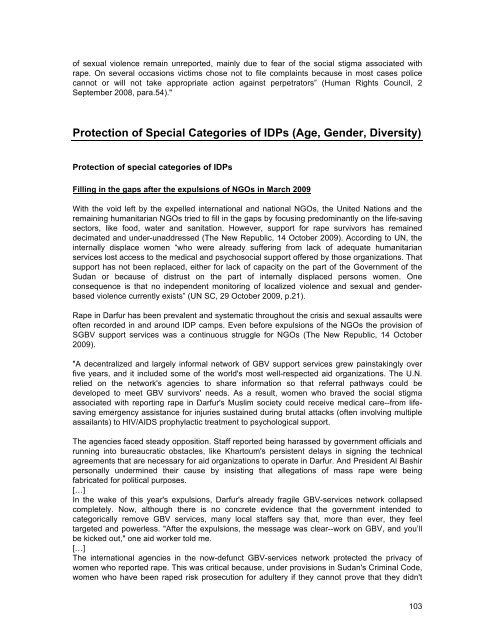SUDAN: Durable solutions elusive as southern IDPs return and ...
SUDAN: Durable solutions elusive as southern IDPs return and ...
SUDAN: Durable solutions elusive as southern IDPs return and ...
You also want an ePaper? Increase the reach of your titles
YUMPU automatically turns print PDFs into web optimized ePapers that Google loves.
of sexual violence remain unreported, mainly due to fear of the social stigma <strong>as</strong>sociated with<br />
rape. On several occ<strong>as</strong>ions victims chose not to file complaints because in most c<strong>as</strong>es police<br />
cannot or will not take appropriate action against perpetrators” (Human Rights Council, 2<br />
September 2008, para.54)."<br />
Protection of Special Categories of <strong>IDPs</strong> (Age, Gender, Diversity)<br />
Protection of special categories of <strong>IDPs</strong><br />
Filling in the gaps after the expulsions of NGOs in March 2009<br />
With the void left by the expelled international <strong>and</strong> national NGOs, the United Nations <strong>and</strong> the<br />
remaining humanitarian NGOs tried to fill in the gaps by focusing predominantly on the life-saving<br />
sectors, like food, water <strong>and</strong> sanitation. However, support for rape survivors h<strong>as</strong> remained<br />
decimated <strong>and</strong> under-unaddressed (The New Republic, 14 October 2009). According to UN, the<br />
internally displace women “who were already suffering from lack of adequate humanitarian<br />
services lost access to the medical <strong>and</strong> psychosocial support offered by those organizations. That<br />
support h<strong>as</strong> not been replaced, either for lack of capacity on the part of the Government of the<br />
Sudan or because of distrust on the part of internally displaced persons women. One<br />
consequence is that no independent monitoring of localized violence <strong>and</strong> sexual <strong>and</strong> genderb<strong>as</strong>ed<br />
violence currently exists” (UN SC, 29 October 2009, p.21).<br />
Rape in Darfur h<strong>as</strong> been prevalent <strong>and</strong> systematic throughout the crisis <strong>and</strong> sexual <strong>as</strong>saults were<br />
often recorded in <strong>and</strong> around IDP camps. Even before expulsions of the NGOs the provision of<br />
SGBV support services w<strong>as</strong> a continuous struggle for NGOs (The New Republic, 14 October<br />
2009).<br />
"A decentralized <strong>and</strong> largely informal network of GBV support services grew painstakingly over<br />
five years, <strong>and</strong> it included some of the world's most well-respected aid organizations. The U.N.<br />
relied on the network's agencies to share information so that referral pathways could be<br />
developed to meet GBV survivors' needs. As a result, women who braved the social stigma<br />
<strong>as</strong>sociated with reporting rape in Darfur's Muslim society could receive medical care--from lifesaving<br />
emergency <strong>as</strong>sistance for injuries sustained during brutal attacks (often involving multiple<br />
<strong>as</strong>sailants) to HIV/AIDS prophylactic treatment to psychological support.<br />
The agencies faced steady opposition. Staff reported being har<strong>as</strong>sed by government officials <strong>and</strong><br />
running into bureaucratic obstacles, like Khartoum's persistent delays in signing the technical<br />
agreements that are necessary for aid organizations to operate in Darfur. And President Al B<strong>as</strong>hir<br />
personally undermined their cause by insisting that allegations of m<strong>as</strong>s rape were being<br />
fabricated for political purposes.<br />
[…]<br />
In the wake of this year's expulsions, Darfur's already fragile GBV-services network collapsed<br />
completely. Now, although there is no concrete evidence that the government intended to<br />
categorically remove GBV services, many local staffers say that, more than ever, they feel<br />
targeted <strong>and</strong> powerless. "After the expulsions, the message w<strong>as</strong> clear--work on GBV, <strong>and</strong> you’ll<br />
be kicked out," one aid worker told me.<br />
[…]<br />
The international agencies in the now-defunct GBV-services network protected the privacy of<br />
women who reported rape. This w<strong>as</strong> critical because, under provisions in Sudan's Criminal Code,<br />
women who have been raped risk prosecution for adultery if they cannot prove that they didn't<br />
103
















